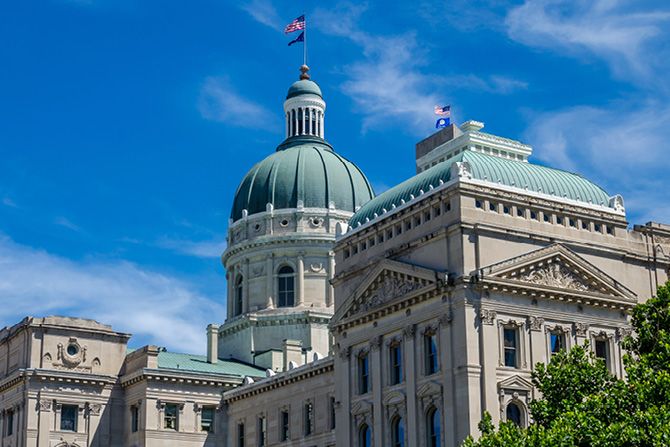Legislative Advocacy
The banking industry saw another successful session, which the IBA generally measures by keeping problematic bills at bay while advocating for beneficial ones. Your Association strongly advocated for two crucial bills this session that aimed to address recent legal challenges faced by financial institutions.
House Enrolled Act (HEA) 1284 was the IBA’s response to two Indiana Supreme Court cases, which aimed to clarify Indiana law regarding changes in the terms of consumer deposit contracts. This legislation affirms the long-standing practice that a consumer’s silence constitutes acceptance of updated terms for deposit accounts. For many years, financial institutions have relied upon the legally grounded practice of the so-called “silence is acceptance” approach to update the terms of their transactional accounts. However, a recent Supreme Court ruling in Land v. IU Credit Union challenged this practice.
Similarly, Senate Enrolled Act (SEA) 188 seeks to mitigate the impact of frivolous class action lawsuits on financial institutions. Responding to industry concerns, the bill establishes a two-year statute of limitations for reviewing deposit account records. This reduction from the current six-year period would reduce the eligible penalties that financial institutions are subject to. This adjustment should work to rebalance the intent of future lawsuits.
Offering Amendments
During the legislative session, the IBA played an active role in molding bills to align with our members’ objectives. One example was HEA 1084, pertaining to the Privacy of Firearms Financial Transactions. The bill was filed in response to the creation of a Merchant Category Code for firearms retailers, which sparked concerns in the gun industry that it could lead to the tracking of firearm purchases. While Visa and Mastercard have halted the implementation of the code, certain states have taken measures to ban the code’s usage – with Indiana now being one of them. The IBA does not have concerns with lawmakers prohibiting the code. However, we expressed concern with the bill because of initial language that gave the Attorney General power to enforce the provisions and penalize violators, allowing the office to investigate financial institutions and essentially act as a new regulator. The IBA worked to modify the bill by shifting the enforcement from the Attorney General to the financial institution’s primary regulator and removing the penalties prescribed for violating the new law.
The IBA was actively involved in HEA 1183, which deals with the foreign ownership of agricultural land. The bill restricts individuals and companies with foreign adversary connections from acquiring agricultural land in Indiana. We worked diligently to address property transfer regulations and emphasized the need for precise definitions, as outlined in previous legislative sessions, on how to dissolve property without holding the lender liable. We collaborated with the author of the bill to ensure the mechanics of the bill would not create issues for lenders. The initial mechanics were not feasible, as they would have resulted in properties being wrapped up in judicial foreclosure for an extended period. Your Association worked with our allies in the Statehouse to propose an amendment to the bill that involved a receivership process, which would be quick, ensure that liens are paid and enable the property to be put back on the market without any issues.
Opposing Problematic Bills
The IBA expressed its strong opposition to various legislative proposals due to their potential impacts on our members. One such proposal was Senate Bill (SB) 28, which aimed to prevent discriminatory practices by financial institutions based on a newly defined “social credit score.” The bill outlined a long list of protected areas, including religion, political affiliation and climate change beliefs, that would fall under the umbrella of a “social credit score.” If a financial institution denied a consumer a financial service, the consumer could request an explanation for the refusal. SB 28 raised several concerns. The proposed additional protections and their unintended consequences were particularly worrying, not to mention the significant operational challenges that financial institutions would face in complying with such a standard. SB 28 did not make it out of committee.
Similarly, HB 1130, which sought to create Economic Development Districts, caused concern due to the creation of a new PACE-like assessment on multiple properties in the creation of the district. These assessments would be used to bond out and fund projects with a broad range of scope, from beautification to sports arenas, with certain funding aspects being in direct competition to financial institutions. Moreover, the property assessments would impose a priority lien on all properties within the district, bypassing the lender’s superior lien. The IBA has expressed concern in the past regarding these proposals. HB 1130 also did not make it out of committee.
HB 1400 proposed the establishment of gold bullion depositories and the introduction of an Indiana-specific electronic currency. The IBA has opposed the creation of a central bank digital currency at the federal level and expressed similar concern with this proposal. The IBA was worried about the significant powers granted to the State Treasurer, the competition with the existing banking system in Indiana posed by the new depositories along with their ability to hold public funds, and the potential conflict of the state-specific electronic currency with the U.S. dollar, which could raise constitutional questions. Due to these issues, the IBA expresses significant concern with HB 1400, which also did not make it out of committee.
Grassroots Success
The industry had a highly successful session, and the IBA would like to extend a special thanks to the many legislators and bankers who worked toward satisfactory outcomes on issues of concern to the banking industry. The effort and engagement put forward by so many will ensure that Indiana continues to be a state where financial institutions can serve their customers well and positively impact Indiana communities and the broader economy.











